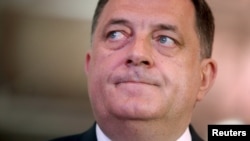Although political tensions in Bosnia-Herzegovina, tinted with ethnic remarks in the wake of a terrorist attack on a police station in Zvornik, seem to have subsided, international and local experts and officials remain concerned about Islamic radicalization in Bosnia.
A police officer was shot dead and two others were injured in the April 27 attack.
The United States and the European Union condemned the attack. The U.S. State Department called on relevant agencies “to conduct a thorough and professional investigation” of the incident and to take all necessary measures so that the “situation is not politicized.”
Daniel Serwer is an expert on Balkan affairs and the Middle East at the Center for Transatlantic Relations at Johns Hopkins University as well as the Middle East Institute in Washington. He said that although the killing was an “outrageous act against the authorities that should be condemned by everyone,” one should not jump to the conclusion that Islamic radicalization in Bosnia is dangerously on the rise.
“Bosnia is a relatively small contributor to the global picture of terrorism. There are many countries producing many more terrorist fighters in the Middle East than Bosnia,” Serwer said in an interview with VOA’s Bosnian service. “Bosnia has to get control over those who would commit murder for political purposes.”
Local and international security experts have also said that compared with figures from other European countries of similar size, the number of Bosnians fighting for the Islamic State militant group is not very large.
"Dangerous phenomenon"
Edward Joseph of the Paul H. Nitze School of Advanced International Studies at Johns Hopkins, said that Islamic radicalization in Bosnia is dangerous, given the ethnic tensions in the country.
“Rising Islamic radicalization in Bosnia, although not huge in numbers, is a dangerous phenomenon because the country is already deeply divided along ethnic lines, and ethnic tensions have been high for a long time,” Joseph said in an interview with VOA’s Bosnian service. “The appearance of young radicalized Bosnian Muslims will only add to those tensions, and further prevent Bosnia from starting to move toward NATO and EU integration.”
The killing of the police officer prompted Bosnian Serb President Milorad Dodik to renew calls for greater independence for the Serb Republic region, which is part of a federation created in 1995 by a U.S.-brokered peace agreement reached in Dayton, Ohio.
Serwer took issue with Dodik’s statement, saying it was “outrageous” for him to be threatening the integrity of the Bosnian state.
“The United States, the EU, other countries, all have been very clear with Republika Srpska [the Bosnian Serb federation] that it is part of Bosnia and Herzegovina, and can only become a member of the EU and NATO as a part of Bosnia and Herzegovina, whose sovereignty and territorial integrity have to be respected,” Serwer said.
Shortly after the attack, Dodik said that the country was full of what he called dormant terrorists and that the security system was inefficient. He indicated that Bosnian Serbs should form a parallel intelligence service.
Serwer, however, said, “He should be cooperating with the authorities as much as possible if he believes that to be true and if he has information to suggest that it is true.”
“I do not think Bosnia is more full of terrorists than any number of other countries," Serwer added. "The fact is that these are statements intended to incite Dodik’s own constituency against Bosnian Muslims. And I find that an unworthy and reprehensible thing for him to be doing.”
Senior officials from Serbia and Bosnia's Serb Republic region, meeting Wednesday in Belgrade, discussed the attack and agreed that the Bosnian Serb federation should cooperate more closely on security to prevent similar incidents in the future.
Speaking to reporters after the meeting, Dodik said the fight against terrorism is a priority of the Bosnian Serb federation but must be a priority for the rest of Bosnia-Herzegovina.
Chance to show progress
Serbian Foreign Minister Ivica Dačić, the current chairman of the Organization for Security and Cooperation in Europe, said in a statement Thursday that “the fight against radicalization will constitute a priority for cooperation between Serbia’s OSCE chairmanship and the chairmanship of the Committee of Ministers of the Council of Europe, which Bosnia and Herzegovina will assume next month.”
Dačić stressed that such “cooperation will provide a unique opportunity to demonstrate the progress the Western Balkans have made in building a better future by overcoming challenges of the past.”
On Wednesday, Dačić completed a two-day visit to Bosnia-Herzegovina, where he met with the three members of the Bosnian presidency — Bosnian, Croat and Serbian — and other Bosnian top officials.
The Muslim Bosnian leaders have condemned the attack in Zvornik in the strongest possible terms.
On Tuesday, Bosnian police arrested two men in the area with possible links to the suspected assailant, identified as Nerdin Ibric, 24.
One of the suspects taken into custody was known to police and had been questioned in the past for possible ties to jihadists in Syria and recruitment efforts for the Islamic State group.
Some 150 Bosnians are believed to have joined the Islamic State militants to fight in Iraq and Syria. Fifty others are believed to have already returned to Bosnia.










